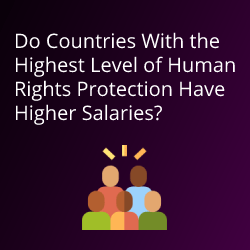The right to human dignity goes hand in hand with the right to fair and equal remuneration.
It is a fact that countries that are highly regarded for the protection of human rights also have higher salaries for their citizens.
These countries have enabled millions of their citizens to break out of the poverty cycle and lead quality lives.
Let’s take a look at the relationship between human rights protection vis-à-vis high salaries.

This is the Law
Numerous legal instruments enshrine the minimum wage as a human right.
The Universal Declaration of Human Rights (UDHR) in article 3 states that every person has a right to equal pay for equal work.
This includes just and favorable remuneration that guarantees an existence worthy of human dignity in addition to other means of social protection.
Article 7 of the International Covenant on Economic, Social, and Cultural Rights (ICESCR) provides for fair wages and equal remuneration for work of equal value without distinction of any kind.
The ILO Minimum Wage Fixing Convention (1970) provides for elements to be taken into consideration when determining the level of minimum wage.
These include the general level of wages in the country, workers’ needs, and economic factors.
This is further supported by the Ethical Trading Initiative Base Code, which states that wages should always be enough to meet basic needs and to provide some discretionary income.
Deduction of wages shall not be permitted as a disciplinary measure and no deduction shall be permitted if not prescribed by national law without the express consent of the worker.
Minimum Wage as a Human Right
One of the fundamental human rights is the right to just remuneration that ensures the existence of human dignity.
There is no single universally accepted amount defined as just remuneration.
Most countries describe it as a wage from full-time work that allows people to lead a decent life as defined by society.
This means the minimum wage will vary from country to country depending on socio-economic and political factors.
Human rights studies show a close link between the enhancement of human rights and fair wages.
Research also suggests that countries that rate high in the human rights index also rank high in salaries and quality of life.
If you are looking forward to studying essays about human rights and minimum wage per country, look no further than the Samplius on https://samplius.com/free-essay-examples/human-rights/.
The site will help you find different types of essay samples and that can make your academic assignments a lot easier to complete.

Higher Human Rights Protection vis-à-vis Higher Minimum Wage by Country
The relationship between human rights protection and the minimum wage exists in many countries.
Some may argue that a higher minimum wage has to do more with economic development than the protection of human rights.
But if you take a close look at the countries with high wages, you will also notice that they rank high in the human rights protection index.
The top 10 list of countries with the highest minimum wage and human rights protection are mostly from Europe.
The U.S is in the top 10 but there are debates as to its credentials on human rights enhancement.
Luxembourg is at the top of the list, with a minimum wage of $18.33/hour for skilled workers over 18 and a minimum wage of $15.53/hour for unskilled workers.
Political and civil liberties are generally respected in the country, making it a safe zone for human and economic development.
Australia also has a strong record of protection of political and civil rights, which is also reflected in its minimum wage of $15.30/hour.
Other countries with high minimum wages and known for advancing human rights include New Zealand at $14.40/hour, Germany at $12.55/hour, the United Kingdom at $12.33/hour, and many more.
How Acceptable is the Minimum Wage?
Numerous arguments are pro or against raising the minimum wage.
Of course, every worker would want his or her minimum wage to be raised.
The proponents of an increase in the minimum wage, including the civil rights movement, argue that it will benefit millions of people and lift struggling workers out of poverty.
For instance, in the U.S, the Congressional Budget Office (CBO) report has some silver linings as it estimates a minimum wage rise to $15 per hour will lift nearly 1 million people out of poverty and over 26 million workers will be affected positively by the increase.
The alternative view against the increase in the minimum wage states that it will cut jobs and increase the prices of goods and services.
Potential job losses will result from businesses absorbing the cost of having to pay employees more wages.
For example, in the U.S, a report from the CBO states that 1.4 million jobs will be lost by the time the Federal minimum wage reaches $15 per hour.
Conclusion
The debate over the relationship between human rights and the minimum wage is ongoing.
Most statutes and conventions both nationally and internationally define the minimum wage as part of a basic human right.
Countries can only ratify these conventions, but only a few countries rank high on both human rights protection and the higher minimum wage.

Well, I asked this question to my school teacher who teaches us human right’s subject and his answer was this is true. The countries who respect human rights they value human work and pay them much price to their work. I really enjoyed reading this https://openclosehrs.com/how-to-spend-your-last-weekend-before-college/ article and knew some fantastic ideas to spend my holidays.
gud